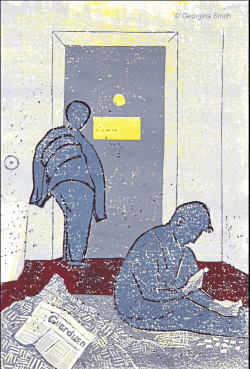
In the mid-1990s, we were excited to hear that Georgina Smith, a Greenham woman, had bought Peaton Glen Wood, a magical 14ha (34-acre) woodland right next to the Coulport Trident warhead store, from the MoD. Through the first Women’s Camp we held there and the many Trident Ploughshares disarmament camps held there, I came to know Georgina. She was clever, fun and full of integrity, never acting as if she owned the place or blowing her own trumpet about the many courageous and important acts she had done as a woman for peace.
Georgina spent her early years in Scotland before attending art school in Oxford. She married, had five children, and a variety of jobs, but she also had a great interest in politics and social justice, joining the first Aldermaston march in 1958.
Active in CND in the ’60s and ’70s, Georgina joined the women at Greenham Common where, throughout the 1980s, she took part in many NVDA actions, resulting in 14 stints in various prisons.
Prosecuted for fence-cutting at Greenham, Georgina, along with Jean Hutchinson and Sarah Hipperson, challenged the Greenham byelaws. After a five-year battle through the courts, they proved that the fence was illegal because it breached the Greenham and Crookham commoners’ rights.
Georgina’s legal expertise not only contributed to the departure of the US air force and their nuclear-armed Cruise missiles, but also prevented the MoD from converting the base into a training ground. In 2000, the fence was removed, the runway dug up, and the protest sites became a memorial peace garden.
In 1989, Georgina returned to Scotland, to the remote Ardnamurchan Peninsula; she restored a dilapidated bothy [cottage], and round it planted saplings that now offer the shelter of mature trees. Shifting her focus to Faslane, Georgina quietly bought Peaton Wood and visited often, joining in camps and actions.
As an accomplished artist, she combined her interests by regularly graffitiing the walls of the West Highland Line railway tunnel where it passed by Faslane, so that she and the other passengers could see her handiwork on their way North.
Arrested during a Faslane 365 blockade, Georgina and Helen John were incensed at the new tactic of holding protesters overnight for court, releasing them after 30 hours’ custody with no trial. They headed for Edinburgh and painted a great many messages on the high court building on the Royal Mile.
Finally having had a chance to state their case in court, they refused to pay a fine and were sentenced to 40 days in prison and ordered to pay £1,500 each in compensation.
As she grew older and more infirm, Georgina passed Peaton Wood to a group of trustees (the Peaton Wood Peace Trust) and, though no longer able to travel for protests, she continued to hang banners on her fence in Ardnamurchan and repaint the CND symbol on her barn for all to see. She managed to remain in her own home for the rest of her life, and died there peacefully with family around her.

